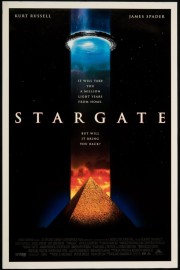Stargate
It’s hard to imagine that Roland Emmerich’s 1994 sci-fi adventure, “Stargate,” because a full-fledged franchise thanks to multiple TV shows after it’s release. However, one look at the film 20 years later, and it’s actually pretty easy to see how it could spawn a franchise– the premise opens itself up to weekly adventures along the lines of a “Star Trek” or later, “Firefly.”
The film stars James Spader, back when Hollywood was trying to make him a leading man after his acclaimed performance in “sex, lies, and videotape,” as Daniel Jackson, a professor whose ideas on the Egyptians and the history of the pyramids and hieroglyphs are the opposite of the conventional thinking on the matter. After a disastrous lecture, he is confronted by an old woman (Viveca Lindfors) with an opportunity to prove himself right. In 1928, her father discovered a circular object with strange markings on it that fly in the face of current academic ideas on Egyptian culture at the time the Great Pyramids were built. With nowhere else to go, he takes the woman up on her offer, and finds another world waiting for him.
This was Emmerich’s second film with screenwriter/producer Dean Devlin (the first was “Universal Soldier”), and they made an interesting pair. Their films aren’t really intellectual exercises but medium budget genre entertainments. After this, they did “Independence Day” (the highest grossing film of 1996) and “Godzilla,” a ridiculous Americanization of the classic monster that bears no semblance to the iconic creature, so it goes without saying their films were a mixed bag. Their love of genre shines through, though, and “Stargate” isn’t necessarily a great film, but it is an entertaining one, with Spader and Kurt Russell (as a military Colonel who is brought back to active duty to lead an expedition when the stargate, the device that was found in 1928, is made to work by Jackson) playing off of each other in a dynamic we saw more of between Will Smith and Jeff Goldblum in “Independence Day.” Smith and Goldblum did it better, but the clash in personalities between Spader and Russell make for some fun moments, especially when they have to navigate life on the world they discover, and come face to face with Ra, the Sun God of ancient Egypt, who is, in fact, an alien surviving in a human body. Ra is played by Jaye Davidson, who made a remarkable splash with his Oscar-nominated performance in “The Crying Game,” but retired from acting after this film. It’s a shame, because even though his Ra is pure, mustache-twirling bad guy, there’s an energy when he’s on screen that neither Russell nor Spader can duplicate.
The film, like all of Emmerich’s, received mixed reviews when it came out, but became a hit with the public, enough of one to give them the freedom to really go big on “Independence Day.” It’s the type of movie that really shouldn’t stand up to scrutiny because it’s too silly and formulaic, but this is now the second time I’ve seen it in the past few months, and it holds up now, even if it’s on a purely superficial level. Emmerich and Devlin know how to dress up sci-fi absurdity with great visual effects and production design, performances that do just enough to make things fun, and an idea that grabs audiences, and elevate it to something memorable. I haven’t seen “Soldier,” but I know it happened on their other three films, whether the results were successful like they are here and in “Independence Day,” or if they resulted in failure like with “Godzilla.” Either way, there’s going to be something you remember about the movie. In “Stargate’s” case, it was in a good way, and ended up being the seed that turned into a wonderful tree for genre fans.










